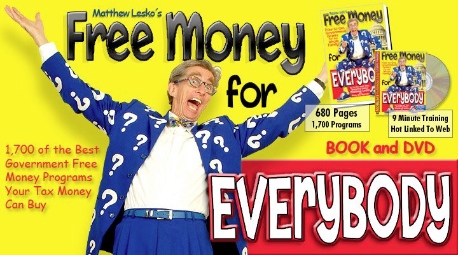You might not know Matthew Lesko‘s name, but there’s a good chance you’ve seen or heard one of his ads. He claims to have been researching government grants for more than two decades and he claims to be the expert on “free money for everybody.”
I’ve always found his ads offensive, because there’s something horribly distasteful to me in the idea of “free money.” There’s no such thing as free money. There’s only money that’s been taken from one group of people and given to another group of people — and that’s always seemed very wrong to me.
But I’ve been thinking lately about this issue, and I’m not sure the case is as simple as I’d like it to be. It’s not that I’ve suddenly started approving of governments coercively taking money from people. But the question of what it’s OK for us to accept from government is more complicated — at least for those of us who believe it’s wrong for the money to be available in the first place.
I know a couple who are having a difficult time financially right now. She’s working full-time while he finishes his college degree. They have a young child, and it’s a struggle to make it financially. But he’s a libertarian who hasn’t been willing to take any government assistance. His in-laws watch them struggle and seem disapproving that he won’t apply for any kind of government aid. Is he a principled man who we should admire? Or is he a fool for not taking the help that’s available?
The traditional libertarian answer is that an honest and principled man takes nothing from government, because whatever he receives has been taken from someone else. I think this is the ideal answer, but is it a workable answer since we’re stuck living under a coercive system? I’m not sure.
There are differing degrees of “taking money from the government.” Few libertarians would argue with someone who accepted an income tax refund, simply because it’s money coming back to the taxpayer in excess of what the government claims belong to it. What about a student loan? That’s a bit more of a gray area. What about attending a state-funded university? Since the tuition is subsidized by money taken from others, that’s taking money from others, isn’t it? What about driving on roads that the state has built? The potential conflicts are endless.
Different people are going to draw the line in different places. Yes, we’re accepting something we didn’t earn when we use government-built roads or use public libraries or government-operated schools, but most people would argue that we don’t have a choice. Since we live in a society where realistic alternatives are impossible — or at least very impractical without living completely off the grid — it seems reasonable to accept those things as a natural consequence of the total system. I think most libertarians would be comfortable with that argument.
 But aren’t the economic conditions in which we live just as much a consequence of the system as anything else? In a free system, there would be more opportunity and you would be able to do a better job of taking care of yourself. So to this way of looking at it, accepting food aid or a subsidized apartment might not be any different than using roads or schools.
But aren’t the economic conditions in which we live just as much a consequence of the system as anything else? In a free system, there would be more opportunity and you would be able to do a better job of taking care of yourself. So to this way of looking at it, accepting food aid or a subsidized apartment might not be any different than using roads or schools.
Honestly, I like being able to be a bit self-righteous in my unwillingness to accept financial aid from governments, but is that just because I like to feel good about myself — and simply because I’ve never faced any situation bad enough that forced me to take what was available? If you’re broke and hungry, is taking food stamps really any worse than using public highways? I’m honestly not sure anymore.
The one thing I am sure of is that accepting the aid isn’t good for the individual, because it can have a way of creating a sense of dependence. So even if taking government financial aid is no different than using streets and libraries, I still don’t recommend it. I think it does something ugly to people on the inside. I think it makes them feel that others owe them things — and I think that’s a destructive thing in the long run.
So in the end, I have very mixed feelings about what to tell someone who’s struggling and needs help. Should I encourage him to remain principled and continue struggling so he can feel better about himself in the long run? Or should I encourage him to consider taking help if it would really make a difference in climbing out of a financial hole.
The entire system of a coercive state taking money from people and making up rules for them is 100 percent wrong. But if we live in a society where that’s the system, should we live within the rules of the system until we can change it? If you’re a principled person who opposes government taking money from others, what do you think are the moral and pragmatic answers to this dilemma?

 Anger and hatred come from hurt — and fear of being hurt again
Anger and hatred come from hurt — and fear of being hurt again Actions more important than words when judging what someone wants
Actions more important than words when judging what someone wants